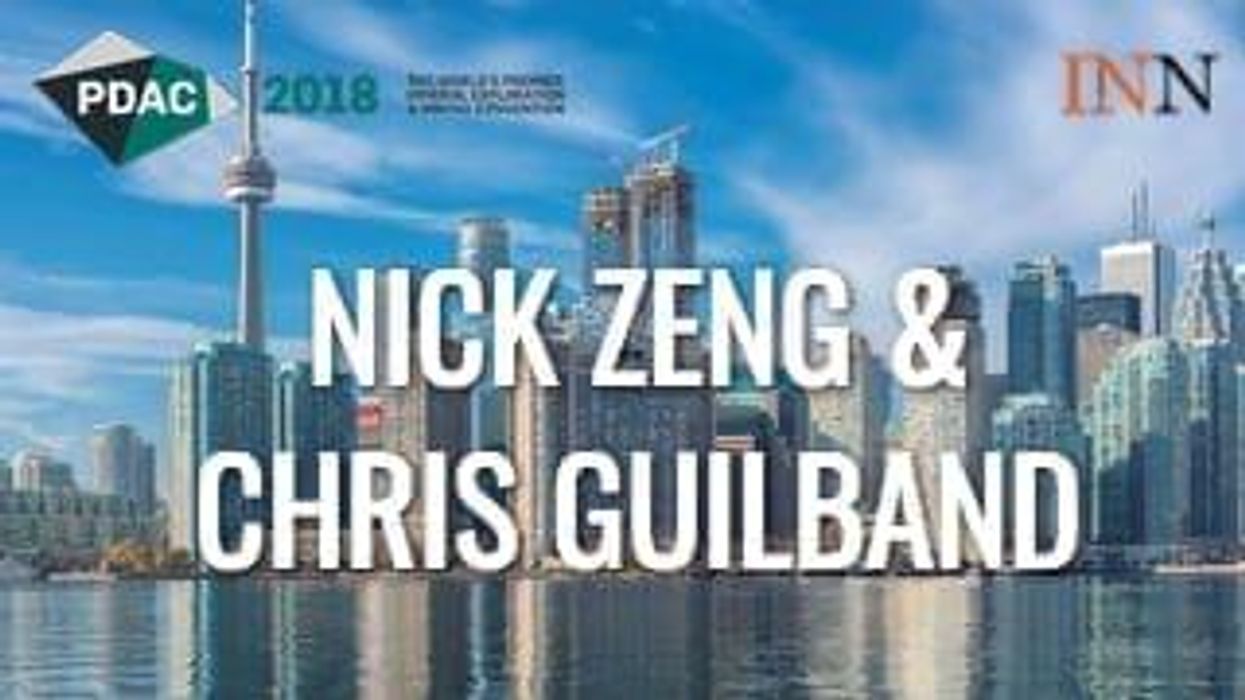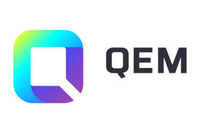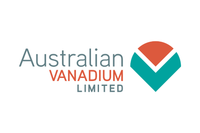VIDEO - Nick Zeng and Chris Guilbaud: Vanadium Flow Batteries Need an Elon Musk
Zeng said vanadium flow batteries could have a dominant market share for utility-scale energy storage applications, but lack an Elon Musk figure.
The Investing News Network caught up with Nick Zeng, chairman, president and CEO of Golden Share Resources (TSXV:GSH), and Chris Guilbaud, board director at the company, at the PDAC conference in Toronto earlier this month to talk about vanadium flow batteries.
Zeng said vanadium flow batteries could have a dominant market share for utility-scale energy storage applications in the future, but not a lot of people understand how they work. He acknowledged that costs need to come down and the energy density of the battery needs to increase.
He said that the technology lacks a salesperson such as Elon Musk, CEO of Tesla (NASDAQ:TSLA), which is producing lithium-ion batteries for electric vehicles. He noted that Tesla’s Powerpack project in South Australia is an example of a “perfect project for the vanadium flow battery. When we’re talking about just the technology alone, I think for that kind of project a vanadium flow battery is better.”
Zeng said the Ontario-based company has two partners, Chinese state-owned Northwest Mining & Exploration Group, which has “the biggest primary vanadium mine in operation,” and Pacific Northwest National Laboratory (PNNL), “which is the government agency under the DOE, Department of Energy of the US, and they developed the most advanced technology for the vanadium flow battery.”
According to data from the US Geological Survey, the US does not have domestic vanadium production and relies on imports from other countries, including Canada, to fulfill demand.
Golden Share signed an agreement for commercializing technology with PNNL’s Battelle Memorial Institute on January 30 to develop a solid-state vanadium battery, which “could be a revolutionary change for the battery industry. It’s still at an early stage, but the PNNL scientists, they’re very excited about it. If that happens, they think that’s going to change the supply, demand, balance of vanadium globally.”
Watch the interview above for more insight from Zeng and Guilbaud, or read the transcript below, which has been edited for clarity. You can also click here to view our PDAC 2018 playlist on YouTube.
INN: Let’s start with Nick, tell me a little bit about telling your background. How you became involved with the company?
NZ: I trained as a chemical engineer and I think I can call myself an entrepreneur. I started my own business when I was 22, started a small manufacturing facility back in China. I expanded it to the US and Canada and we set up a designing facility, a distribution facility and a customer service facility. Before, I was just a major shareholder in Golden Share but like many people getting involved, like some you know, here still playing in this industry. I love junior exploration and I put a lot of money into Golden Share but things were not turning out well. So, I thought maybe as a major shareholder, I should give myself one more try. That’s how I got involved.
INN: Great, and what about yourself Chris?
CG: First and foremost, I’m an investor. So, I like to take care of the shareholders. I like to take care of the financing side of it. I was involved about eight years ago before restructuration and the only who stayed with the company to the restructuration. So, I’m helping Nick and the company on that side.
INN: I know that you have some exploration properties in Ontario, but I think people are really interested in hearing more about some of the vanadium projects that you have going on. So, can you talk a little bit about that?
NZ: Yes, we’ve worked on exploration in Ontario and we love Ontario. As a Chinese, you can tell, I was retained by the Chinese companies back to 2010- 2011 and I traveled globally looking for resources. The more places I traveled, the better I like Ontario. I like Canada. I feel like, okay, we have folks in Ontario. But the problem is, the project we have in Ontario, they’re not able to give the Golden Share a home run. So, it’s okay, probably in the market it’s good to show the value but in today’s market, we felt like we needed a better opportunity. So, I took over the Golden Share May 1st, 2015 after they finished the internal evaluation of the projects. We’re looking for the property that can give us a home run. We noticed the energy metals and we checked all the energy metals that you can name- lead, cobalt, everything. We felt that it was too late for us to get into lithium-ion batteries but we probably could be a leader in vanadium back in 2015. So, that is why we got into vanadium projects.
INN: Tell me a little bit about vanadium then. It may be investors don’t really know about it as well as lithium ion.
NZ: Right now, most people are talking about the vanadium flow battery, which is actually a very simple technology. It’s not high tech; it’s very easy to understand. Anybody who has the basic chemical redox knowledge will understand vanadium flow batteries. The problem with lithium-ion batteries, I think, is that they have a much higher energy density but more importantly, they have a great salesperson called Elon Musk and with vanadium flow batteries, you don’t have that person yet. We think in the future that vanadium flow batteries could have a dominant market share for utility scale, ultra-large electro state storage applications. I am personally disappointed that Elon Musk did that project in Australia. That’s a perfect project for the vanadium flow battery. When we’re talking about just the technology alone, I think for that kind of project a vanadium flow battery is better. It’s just that vanadium flow batteries don’t have a better salesperson than Elon Musk.
INN: Are there things that are better suited towards vanadium redox flow batteries in comparison to lithium ion. We’ve seen lithium ion being used for cars, for example.
NZ: When you’re talking about energy storage, we’re actually talking about a battery. We’re talking about two types of batteries: one that is mainly focused on power and the other one on energy storage. When you’re talking about renewable energy storage, you’re talking about long hours. That’s the beauty of the redox. For lithium-ion, I think they’re doing a better job of producing power especially considering the energy density but I think it’s a different application. When you fall into the utility grade application it’s because you’re looking for larger energy storage capacity for longer hours. With lithium-ion, in a way you’re focusing on power and they all know the type of car that you’re using, requiring thousands, more than ten thousand single cells to power a car. When you try to power something larger, for the utility grade, you’re going to manage millions or billions of cells. It’s almost mission impossible but we all know Elon Musk is a genius because he’s doing that and I’m more impressed by the way he’s doing it. He’s taking the same approach to the Tesla cars. He’s using the same idea for his Space X company because he’s adding small rocket engines to make a bigger one and send his car into the space. What I’m trying to say is: if you’re going to use one key to lock all the locks in the whole world eventually that is not going to work.
INN: So vanadium needs a hero?
NZ: We need a likable salesperson such as Elon Musk. If we are talking to an engineer and a scientist about just the technology used to produce electricity for utility-scale applications, I think it’s almost a no-brainer and people will say yes, the vanadium flow battery is probably the better choice. But when you’re doing business, the salesperson has their skills. That’s another thing, right?
INN: Right, for sure. Can you talk about some of the things that the company is doing right now? You’ve signed a deal recently with a Chinese firm?
NZ: Yes. If you check out the information available on vanadium – it’s still a small commodity and there’s not lot of people involved because they don’t understand it. Just like about 10 years ago, not a lot of people talking about lithium. Vanadium is a very interesting commodity and I personally don’t think there’s a shortage of vanadium right now. It’s not my view. It’s the US Geological Survey. There’s plenty of vanadium available globally. We are a small company and we have to make sure we concentrate our research and do something we are good at and do not work with too many other people. This is why we mainly work with two companies. We call them world-class partners and other people probably have a world-class department but we have world-class partners. One is Northwest Mining Group based in China and they have the biggest primary vanadium mine in operation. So, not like other people that hope they are going to bring vanadium to market. Our partner, their mine has been in production since 2011. They have been in the market for seven years already. Their mine differs from other vanadium mines. It’s a VTM. Vanadium’s it’s primary product. It’s suitable for battery applications and is not only good for the steel industry. That is why we picked them to be our partner possibly to scale the best source of vanadium for vanadium battery applications. The PNNL, the full name is the Pacific Northwest National Laboratory, which is the government agency under the DOE, Department of Energy of the USA and they developed the most advanced technology for the vanadium flow battery. That is why we chose to work with them, to commercialize their technology together with our partner back in China with a possible vast source of vanadium.
INN: Great. So you have an agreement with PNNL and then that is to produce vanadium electrolyte?
NZ: Yes.
INN: Okay, and then to sell that back and develop a battery with the Chinese firm?
NZ: Yes, I mean, when the main component of a vanadium flow battery is what we call “stacks” that generate the power with circulating electrolyte solution that generates electricity and it will also have what we call the battery management system and the stacks are actually almost extender products. Everybody has their own technology but I think it’s more extender products. The battery management system is mainly in the software and so, the big support is the vanadium electrolyte, they sink and it’s more like you’re working with Coca Cola then with a bottling company. So, we made a choice. We want to be Coca Cola and we don’t want to be a bottling company. So, yes, our strategy is trying to work with other battery manufacturers in China mainly, try to lead them to custom build the battery for us based on the most advanced vanadium electrolyte. We got the license from the PNNL.
INN: Great. What’s ahead for 2018 in terms of the company and future plans?
NZ: I’m very excited about 2018. I think vanadium flow batteries are a great technology that is going to change how people get their electricity but we still have several roadblocks to overcome. For example, we have to increase the energy density. We have to decrease the cost and we have to make people understand. More importantly, we have to develop a business model to make sure from the beginning that we can deliver and make sure our shareholders can enjoy a sustainable share profitable bonus because as I said, we don’t have Elon Musk. We cannot push our stock more than double in one year where you are losing a billion dollars every quarter, right? But we don’t have that, so we have to more focus on the technology part and I think one of the key things for Golden Share is that we just signed the agreement with PNNL. We are developing the solid state vanadium battery. That could be a revolutionary change for the battery industry. It’s still at an early stage but the PNNL scientists, they’re very excited about it. If that happens, they think that’s going to change the supply, demand, balance of vanadium globally. The vanadium flow battery is not going to change but for the vanadium solid state battery, if that happens, it is going to change the market for vanadium. So, we’re working on that. We signed an agreement and we announced that on January 30th because our partner, they’re scientists, they’re low key, so we don’t really promote that. So, a lot of people they don’t understand what are we getting, which is a great opportunity to change the battery industry in the future.
INN: Great. I’m pretty much out of questions. I would then ask you both to give me your input on this last question — what makes Golden Share attractive to investors? Maybe we’ll start with you, Chris.
CG: Well, I think more and more people now, they’re becoming aware of energy storage and we’re working on awareness for vanadium. I think we’re in a great position right now. Hopefully, we can have a great year second half of 2018, get the same kind of return on investment we got last year.
INN: I had to look at your today staff performance. So, maybe if you want to talk about that as well.
CB: Exactly, we’re doing a great job in terms of promotion. People, I think they like the stories. So, that’s our focus right now.
INN: And for you Nick?
NZ: I’m not a promoter and I trained as a chemical engineer and I set up my own business and my goal is to try to make money for my shareholders and not try to burn their money. I was burned before and I don’t like to do the same thing for my shareholders. I think we’re probably slow but we are making big progress. I want the people to understand what are we getting and I want people to see the potential of the Golden Share and I want people not only check for one year, check for three years and that’s when they can take over the Golden Share. I think the future of the Golden Share will be better than before.
Don’t forget to follow us @INN_Resource for real-time news updates!
Securities Disclosure: I, Melissa Shaw, hold no direct investment interest in any company mentioned in this article.
Editorial Disclosure: The Investing News Network does not guarantee the accuracy or thoroughness of the information reported in the interviews it conducts. The opinions expressed in these interviews do not reflect the opinions of the Investing News Network and do not constitute investment advice. All readers are encouraged to perform their own due diligence.


